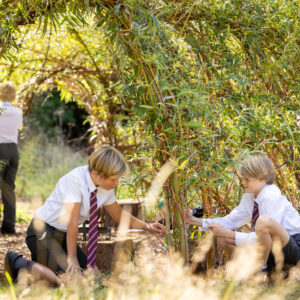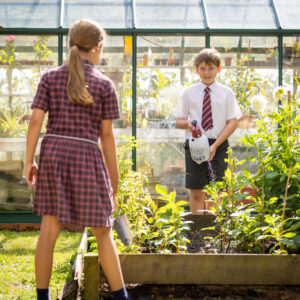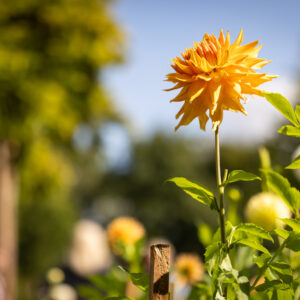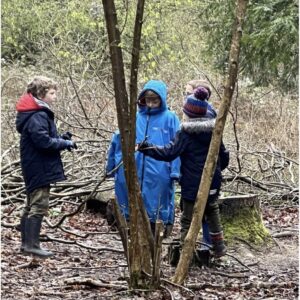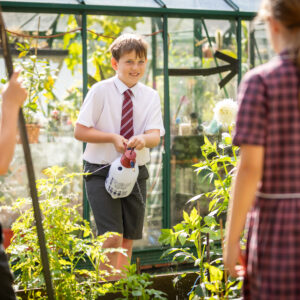Older children enjoy the benefit of the outdoor environment as well as the younger ones. There is a deeper learning that occurs when children put into practice in the real world that which they learn in a classroom. The learning that takes place in the natural environment can be truly inspirational. Our teachers harness this to bring curriculum-based learning to life. We use the grounds and its multiple habitats and eco-systems for science, geography, history, art, biology and for many other curriculum applications such as field study and data collection. We also camp out in the woodland with Years 7 and 8 at the start of the summer term.
We aim to foster a deeper immersion in nature, integrating outdoor learning purposefully into the curriculum, encompassing art, design, adventurous play, ecology, and environmental awareness, engaging all pupils with their environment in hands-on, meaningful ways; we nurture ‘human skills’ through outdoor activities, such as collaboration, problem-solving, teamwork, joy, and safe risk-taking and aim to create a unique and material impact on our local natural environment.
Ecology
With these goals in mind, and informed by pupil feedback, we invested in a wide range of ecological actions to deepen connections with the natural world.
We upskilled cohorts of pupil ‘Ecology Captains’ in sustainability, biodiversity, and local and wider ecology. An incredibly enthusiastic and growing group of pupils who thrive though having agency and stewardship of this initiative. Peer-to-peer knowledge sharing is now substantial; younger pupils look up to their older peers, and being an eco-warrior is viewed as pretty cool.
Our idyllic woodland setting and approach gives children space to play, explore, feel connected and grow beyond the norm. Our forest awaits and there is certainly magic in the air at our school. Why not come and explore it with us?
Benefits of learning in nature’s classroom
Language skills – Children who play outside develop better language skills. Some of children’s most developed language emerges naturally when they are playing outdoors. Research shows that children use five times as many words when they play outdoors compared to indoors. It’s long been known that physical activity helps children find their voice. Children aren’t inhibited by volume or the pressure of talking in front of their peers. Instead, they are able to let off steam and express their opinion in a fun, non-intimidating setting.
Physical and sensory development – Being outside is a brilliant sensory experience for young children. There is so much for them to see, explore and learn. The changing nature of the outdoors makes it an incredibly stimulating and multi-sensory place to play. This is important as young children learn and gain experience through all their senses.
Executive function – These are the skills that help us plan, prioritise, troubleshoot, negotiate, and multitask; they are crucial for our success. Creativity falls in here, too, and using our imagination to problem-solve and entertain ourselves. These are skills that must be learned and practised and to do this, children need unstructured time. They need time with other children to be allowed to make up their own games, figure things out, and amuse themselves. Being outside gives them opportunities to develop these important life skills.
Motor skills – Young children need the opportunity to use their whole body and develop their gross motor skills. They have space to run and jump outside. They can also develop their fine motor skills as they pick up natural treasures such as leaves and fir cones.
Social skills – Indoor spaces can often feel overcrowded to children and naturally, they may feel intimated in this type of environment. More space outdoors can help children to join in and ‘come out of their shells’.
Independence – The extra space offered by being outdoors will give children the sense of freedom to make discoveries by themselves.
Develops an understanding of risk – Being outside provides children with more opportunities to experience risk-taking. They have the chance to take part in tasks on a much bigger scale and complete them in ways they might not when they are indoors. This develops the confidence and bravery to face life’s inevitable risks. The lessons we learn from failure are just as important as those we learn from success.
Encourages an active, healthy lifestyle for life – Through physical activity and challenges, being outdoors helps children sleep, eat, and live more healthily. This encourages them to form healthy habits for life.
Appreciation of nature and the environment – Children become joyful in their appreciation of the world and responsible as they learn how to take care of the environment around them.


